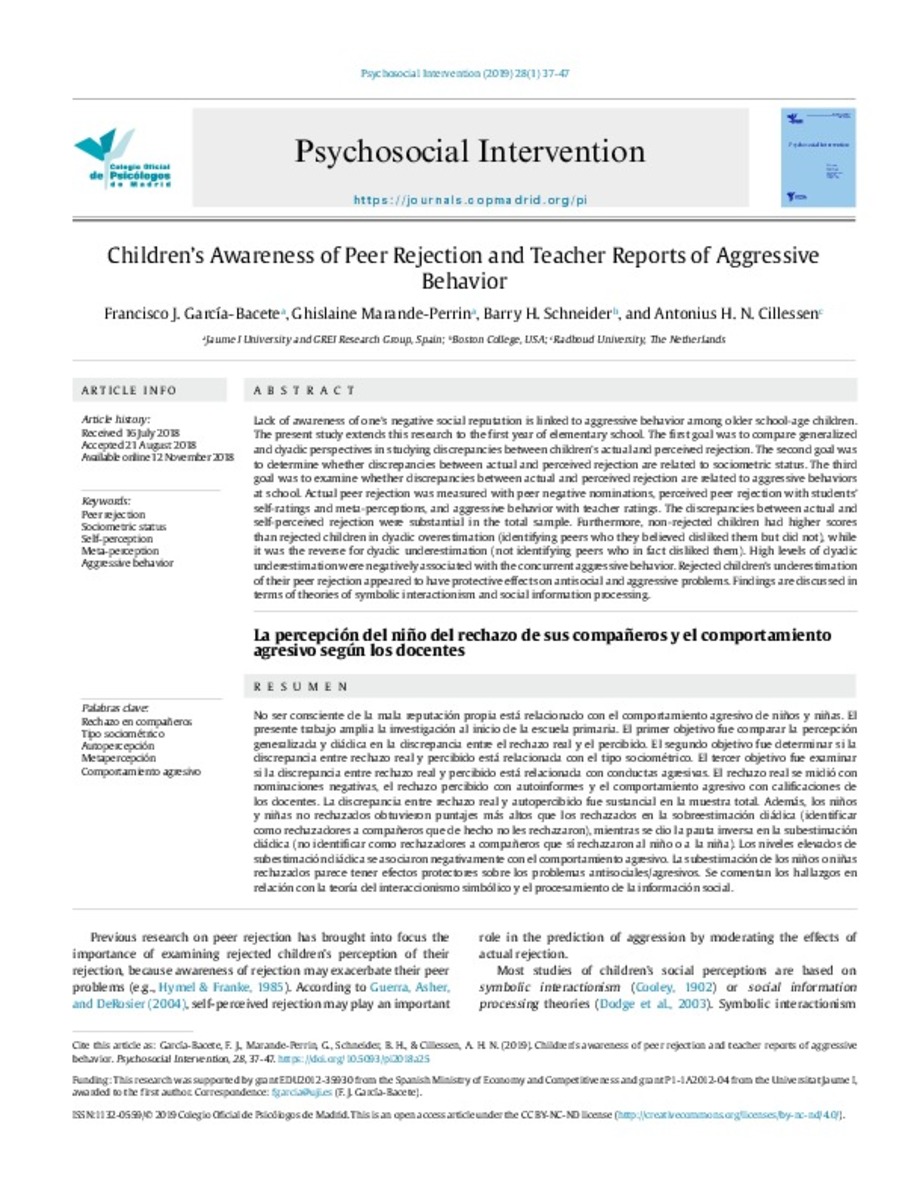Mostrar el registro sencillo del ítem
Children’s Awareness of Peer Rejection and Teacher Reports of Aggressive Behavior
| dc.contributor.author | García Bacete, Francisco Juan | |
| dc.contributor.author | Marande Perrin, Ghislaine | |
| dc.contributor.author | Schneider, Barry H. | |
| dc.contributor.author | Cillessen, Antonius H. N. | |
| dc.date.accessioned | 2019-01-08T15:47:12Z | |
| dc.date.available | 2019-01-08T15:47:12Z | |
| dc.date.issued | 2019 | |
| dc.identifier.citation | García-Bacete, F. J., Marande-Perrin, G., Schneider, B. H., & Cillessen, A. H. N. (2018). Children’s awareness of peer rejection and teacher reports of aggressive behavior. Psychosocial Intervention. Ahead of print. https://doi.org/10.5093/pi2018a25 | ca_CA |
| dc.identifier.issn | 1132-0559 | |
| dc.identifier.issn | 2173-4712 | |
| dc.identifier.uri | http://hdl.handle.net/10234/179539 | |
| dc.description.abstract | Lack of awareness of one’s negative social reputation is linked to aggressive behavior among older school-age children. The present study extends this research to the first year of elementary school. The first goal was to compare generalized and dyadic perspectives in studying discrepancies between children’s actual and perceived rejection. The second goal was to determine whether discrepancies between actual and perceived rejection are related to sociometric status. The third goal was to examine whether discrepancies between actual and perceived rejection are related to aggressive behaviors at school. Actual peer rejection was measured with peer negative nominations, perceived peer rejection with students’ self-ratings and meta-perceptions, and aggressive behavior with teacher ratings. The discrepancies between actual and self-perceived rejection were substantial in the total sample. Furthermore, non-rejected children had higher scores than rejected children in dyadic overestimation (identifying peers who they believed disliked them but did not), while it was the reverse for dyadic underestimation (not identifying peers who in fact disliked them). High levels of dyadic underestimation were negatively associated with the concurrent aggressive behavior. Rejected children’s underestimation of their peer rejection appeared to have protective effects on antisocial and aggressive problems. Findings are discussed in terms of theories of symbolic interactionism and social information processing. | ca_CA |
| dc.description.abstract | No ser consciente de la mala reputación propia está relacionado con el comportamiento agresivo de niños y niñas. El presente trabajo amplia la investigación al inicio de la escuela primaria. El primer objetivo fue comparar la percepción generalizada y diádica en la discrepancia entre el rechazo real y el percibido. El segundo objetivo fue determinar si la discrepancia entre rechazo real y percibido está relacionada con el tipo sociométrico. El tercer objetivo fue examinar si la discrepancia entre rechazo real y percibido está relacionada con conductas agresivas. El rechazo real se midió con nominaciones negativas, el rechazo percibido con autoinformes y el comportamiento agresivo con calificaciones de los docentes. La discrepancia entre rechazo real y autopercibido fue sustancial en la muestra total. Además, los niños y niñas no rechazados obtuvieron puntajes más altos que los rechazados en la sobreestimación diádica (identificar como rechazadores a compañeros que de hecho no les rechazaron), mientras se dio la pauta inversa en la subestimación diádica (no identificar como rechazadores a compañeros que sí rechazaron al niño o a la niña). Los niveles elevados de subestimación diádica se asociaron negativamente con el comportamiento agresivo. La subestimación de los niños o niñas rechazados parece tener efectos protectores sobre los problemas antisociales/agresivos. Se comentan los hallazgos en relación con la teoría del interaccionismo simbólico y el procesamiento de la información social. | ca_CA |
| dc.format.extent | 11 p. | ca_CA |
| dc.format.mimetype | application/pdf | ca_CA |
| dc.language.iso | eng | ca_CA |
| dc.publisher | Elsevier | ca_CA |
| dc.relation.isPartOf | Psychosocial Intervention, 2018. | ca_CA |
| dc.rights | ISSN:1132-0559/© 2018 Colegio Oficial de Psicólogos de Madrid. This is an open access article under the CC BY-NC-ND license (http://creativecommons.org/licenses/by-nc-nd/4.0/). | ca_CA |
| dc.rights | Attribution-NonCommercial-NoDerivatives 4.0 Internacional | * |
| dc.rights.uri | http://creativecommons.org/licenses/by-nc-nd/4.0/ | * |
| dc.subject | Peer rejection | ca_CA |
| dc.subject | Sociometric status | ca_CA |
| dc.subject | Self-perception | ca_CA |
| dc.subject | Meta-perception | ca_CA |
| dc.subject | Aggressive behavior | ca_CA |
| dc.subject | Rechazo en compañeros | ca_CA |
| dc.subject | Tipo sociométrico | ca_CA |
| dc.subject | Autopercepción | ca_CA |
| dc.subject | Metapercepción | ca_CA |
| dc.subject | Comportamiento agresivo | ca_CA |
| dc.title | Children’s Awareness of Peer Rejection and Teacher Reports of Aggressive Behavior | ca_CA |
| dc.title.alternative | La percepción del niño del rechazo de sus compañeros y el comportamiento agresivo según los docentes | ca_CA |
| dc.type | info:eu-repo/semantics/article | ca_CA |
| dc.identifier.doi | https://doi.org/10.5093/pi2018a25 | |
| dc.relation.projectID | EDU2012-35930 ; P1-1A2012-04 | ca_CA |
| dc.rights.accessRights | info:eu-repo/semantics/openAccess | ca_CA |
| dc.relation.publisherVersion | https://journals.copmadrid.org/pi/article.php?id=453fadbd8a1a3af50a9df4df899537b5&title=children&rsquos-awareness-of-peer-rejection-and-teacher-reports-of-aggressive-behavior | ca_CA |
| dc.type.version | info:eu-repo/semantics/publishedVersion | ca_CA |
Ficheros en el ítem
Este ítem aparece en la(s) siguiente(s) colección(ones)
-
PSI_Articles [595]
Articles de publicacions periòdiques








